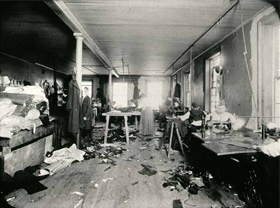Results of the Data Obtained by the Investigation
Page 128
NEGLECT OF THE HUMAN FACTOR
Brief as was the period devoted to the investigation, limited as was the number of industries and establishments inspected, and incomplete as was necessarily all our data, the conclusion that forcibly impressed itself, after the completion of the preliminary investigation, was that the human factor is practically neglected in our industrial system.
Many of our industries were found housed in palatial loft buildings, and employing the most improved machinery and mechanical processes, but at the same time greatly neglecting the care, health and safety of their employees. Our system of industrial production has taken gigantic strides in the progressive utilization of natural resources and the exploitation of the inventive genius of the human mind, but has at the same time shown a terrible waste of human resources, of human health and life.
It is because of this neglect of the human factor that we have found so many preventable defects in industrial establishments, such a large number of workshops with inadequate light and illumination, with no provision for ventilation, without proper care for cleanliness, and without ordinary indispensable comforts such as washing facilities, water supply, toilet accommodations, dressing-rooms, etc. It is because of utter neglect on the part of many employers that so many dangerous elements are found in certain trades. These elements are not always necessary for the successful pursuit of the trade, and their elimination would mean a great improvement in the health of the workers, and would stop much of the misery caused by the occupational diseases incident to certain industries.
It is true that many enlightened employers, especially those who control large establishments, show a commendable zeal for the health of their operatives, but such care not being supervised or organized under scientific direction, leaves much to be desired.
In the matter of industrial production, we are still under the sway of the old "laissez faire" policy, and there is still very...
Page 129
...inadequate supervision of industries with a view to lessening dangers to the health and life of the working class.
There is still no regulation whatever of factory construction, outside of the rules adopted by municipal building codes which regulate only the width of walls, the strength of foundations, etc. all matters of sanitation are without control during the times when such control could best serve the purpose of the buildings and the interests of those destined to inhabit them.
The construction of tenement houses in New York City is under the strict supervision of the Tenement House Department. There is no reason why the interests of the greater number of persons inhabiting factory buildings should not be conserved as much as the interests of the tenement house dwellers.
IGNORANCE OF THE NUMBER AND OF THE LOCATION OF INDUSTRIAL ESTABLISHMENTS
In the course the investigation, much difficulty was found in locating all the establishments in an industry or a district. At present there is no method by which every manufacturing establishment may be located, and its existence brought to the attention of the authorities. At present, any person who has the necessary capital or credit may build, lease, or hire any ramshackle building, engage as many workers as he can crowd into his premises, and work them under any conditions. The very existence of this establishment may not be known to the Labor Department, until it is discovered by accident.
In the investigation of the Cloak and Suit Industry, made during the last year, by the Joint Board of Sanitary Control, about 30 per cent of the shops were found unrecorded, and in our own investigation, our inspectors found the utmost difficulty in tracing many establishments which were never recorded by the Labor Department in the list sent by them to us.
Page 130
LACK OF STANDARDS
The worker spends the greater part of his waking hours in the workshop and factory. The proper sanitation of the workplace is therefore of paramount importance to the worker, both to his health and to the security of his life.
It is only lately that intelligent employers have awakened to the fact that factory sanitation is very closely related to industrial efficiency, and that neglect of this subject by factory owners is detrimental to their own interests as well as extremely injurious to their workers.
Page 131
It is also but lately that the workers themselves have realized the value of proper sanitation of factories, and have added this to the economic demands of their labor organizations.
Unfortunately, there is hardly a field of science where there is such a complete lack of standards as in industrial hygiene.
It is on account of this deplorable lack of standardization that many provisions of the labor laws are so vague and indefinite, and that large employers, willing to introduce modern safety devices and sanitary conveniences in their factories, are unable to do so with complete success. It is also this lack of standards that makes the enforcement of the sanitary clauses of the labor laws so unsatisfactory, for it is a most difficult matter for the inspector to exactly determine what is meant by "sufficient" fire protection, "proper" light, "adequate" ventilation, "fit" toilet accommodations, etc.
The standardization of factory sanitation is one of the most important matters which the Commission has considered during its brief preliminary investigation, and we intend to devote much attention to it if our activities are continued.
New York (State) Factory Investigating Commission, Preliminary Report of the Factory Investigating Commission, 1912, 3 vols. (Albany, New York: The Argus Company, printers, 1912), 1:128-131.

